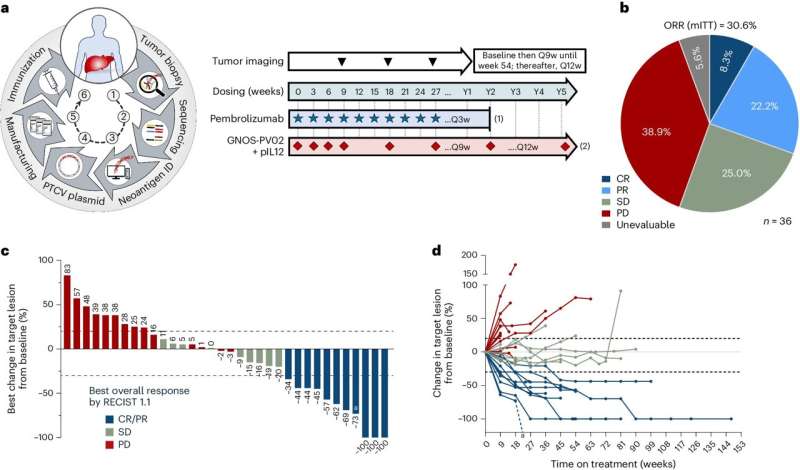This article has been reviewed according to Science X's editorial process and policies. Editors have highlighted the following attributes while ensuring the content's credibility:
fact-checked
peer-reviewed publication
reputable news agency
proofread
Adding vaccine to immunotherapy for liver cancer shows promise in early trial

A custom-made anti-tumor vaccine added to standard immunotherapy was twice as likely to shrink liver cancer as when a patient received immunotherapy alone, a new study shows.
The vaccine could help liver cancer patients live longer, as fewer than one in 10 survive five years after their diagnosis, the researchers noted.
In fact, about 8% of patients who received the new vaccine had a complete response, with no evidence of cancer left, the results showed.
"We are at an exciting time in new therapy development. Personalized vaccines are the next generation of vaccines that are showing promise in treating difficult cancers," said researcher Dr. Elizabeth Jaffee, deputy director of the John Hopkins Kimmel Cancer Center in Baltimore.
For the study, researchers recruited 38 patients with hepatocellular carcinoma, the most common type of liver cancer.
All of the patients received the custom vaccine along with pembrolizumab (Keytruda), an immunotherapy drug that helps activate the immune system to attack cancer cells.
The vaccine was made from a liver tumor biopsy taken from each individual patient. Researchers analyzed the tumor to figure out which mutated genes are causing it, and then they crafted a personalized vaccine to target a patient's cancer.
Each vaccine can include up to 40 genes. The vaccine helps the immune system locate the cancer based on these genes, and then destroy it.
Researchers described the therapy as a "one-two punch," as the immunotherapy drug activates the immune system and the vaccine teaches it to identify and kill a person's cancer.
In the lab, researchers found evidence that immune cells created in response to patients' cancer had in fact traveled to the tumor and attacked cancer cells there.
Researchers also found that patients who received vaccines targeting the greatest number of mutated proteins responded the best to the therapy.
"The study provides evidence that a personalized cancer vaccine can enhance clinical responses to anti-PD-1 therapy," said lead researcher Dr. Mark Yarchoan, an associate professor of oncology at the Johns Hopkins University School of Medicine.
The findings were published April 7 in the journal Nature Medicine and were presented over the weekend at the American Association for Cancer Research annual meeting in San Diego.
"A larger, randomized clinical trial will be needed to confirm this finding, but the results are incredibly exciting," he said in a meeting news release.
More information: Mark Yarchoan et al, Personalized neoantigen vaccine and pembrolizumab in advanced hepatocellular carcinoma: a phase 1/2 trial, Nature Medicine (2024). DOI: 10.1038/s41591-024-02894-y
The American Cancer Society has more on liver cancer.
© 2024 HealthDay. All rights reserved.



















